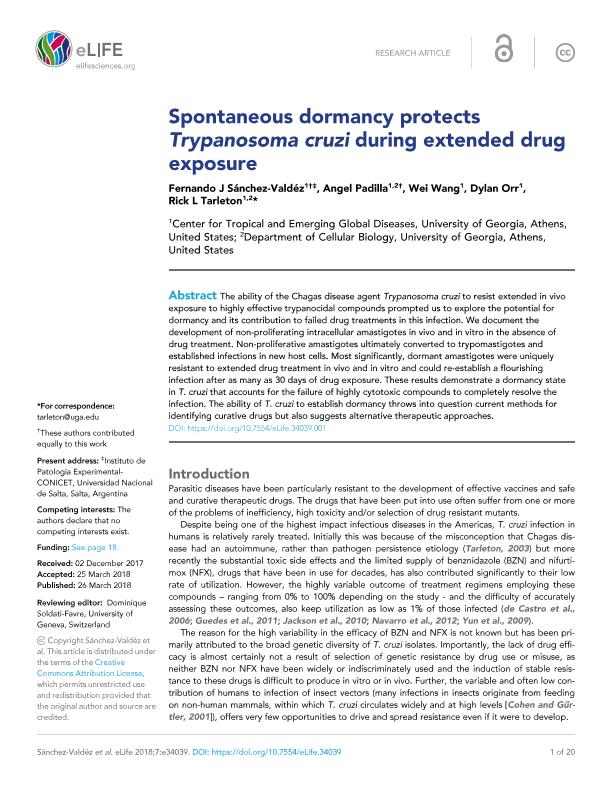Artículo
Spontaneous dormancy protects Trypanosoma cruzi during extended drug exposure
Sánchez Valdéz, Fernando Javier ; Poveda Padilla, Angélica Gabriela; Wang, Wei; Orr, Dylan; Tarleton, Rick L.
; Poveda Padilla, Angélica Gabriela; Wang, Wei; Orr, Dylan; Tarleton, Rick L.
 ; Poveda Padilla, Angélica Gabriela; Wang, Wei; Orr, Dylan; Tarleton, Rick L.
; Poveda Padilla, Angélica Gabriela; Wang, Wei; Orr, Dylan; Tarleton, Rick L.
Fecha de publicación:
26/03/2018
Editorial:
eLife Sciences
Revista:
eLife
e-ISSN:
2050-084X
Idioma:
Inglés
Tipo de recurso:
Artículo publicado
Clasificación temática:
Resumen
The ability of the Chagas disease agent Trypanosoma cruzi to resist extended in vivo exposure to highly effective trypanocidal compounds prompted us to explore the potential for dormancy and its contribution to failed drug treatments in this infection. We document the development of non-proliferating intracellular amastigotes in vivo and in vitro in the absence of drug treatment. Non-proliferative amastigotes ultimately converted to trypomastigotes and established infections in new host cells. Most significantly, dormant amastigotes were uniquely resistant to extended drug treatment in vivo and in vitro and could re-establish a flourishing infection after as many as 30 days of drug exposure. These results demonstrate a dormancy state in T. cruzi that accounts for the failure of highly cytotoxic compounds to completely resolve the infection. The ability of T. cruzi to establish dormancy throws into question current methods for identifying curative drugs but also suggests alternative therapeutic approaches.
Palabras clave:
DORMANCY
,
AMASTIGOTES
,
TRYPANOSOMAS
,
TREATMENT
Archivos asociados
Licencia
Identificadores
Colecciones
Articulos(IPE)
Articulos de INST.DE PATOLOGIA EXPERIMENTAL
Articulos de INST.DE PATOLOGIA EXPERIMENTAL
Citación
Sánchez Valdéz, Fernando Javier; Poveda Padilla, Angélica Gabriela; Wang, Wei; Orr, Dylan; Tarleton, Rick L.; Spontaneous dormancy protects Trypanosoma cruzi during extended drug exposure; eLife Sciences; eLife; 7; 26-3-2018; 1-20
Compartir
Altmétricas



